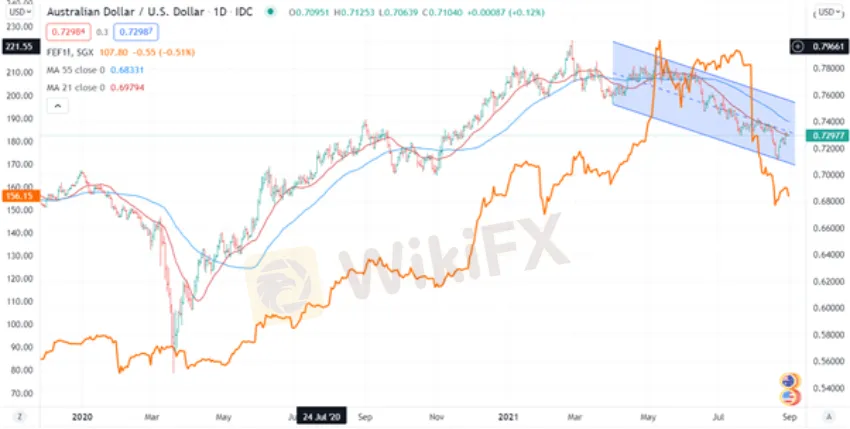简体中文
繁體中文
English
Pусский
日本語
ภาษาไทย
Tiếng Việt
Bahasa Indonesia
Español
हिन्दी
Filippiiniläinen
Français
Deutsch
Português
Türkçe
한국어
العربية
The Australian Dollar is Facing China PMI Data as Iron Ore Prices Fall
Abstract:The Australian dollar declines against a stronger dollar, and iron ore prices decrease.

THE AUSTRALIAN DOLLAR, THE AUD/USD, IRON ORE, CHINA, AND THE PMI ARE ALL TALKING POINTS.
The Australian dollar declines against a stronger dollar, and iron ore prices decrease.
Chinese manufacturing PMI data will be used to assess the Chinese economy.
The AUD/USD is approaching a trendline that might serve as a support level for a comeback.
THE ASIA-PACIFIC OUTLOOK FOR THURSDAY
After markets finished neutral in New York, the Australian Dollar gave way to a generally firmer US Dollar overnight. Earlier this week, Federal Reserve Chair Jerome Powell said, “We don't know if we will be moving back to something that looks like, or is relatively comparable,” to the prior scenario at a conference for central bankers in Portugal. “I don't believe we're going back,” ECB President Christine Lagarde stated with greater self-assurance.
The overall message provided by central bankers showed that they are ready to forgo economic growth
to reduce inflation. During one night, market-based inflation indices such as breakeven rates plummeted. For the first time since February 11, the US two-year breakeven rate (a measure of two-year inflation) fell to 3.45 percent. As a result, gold's price fell for the third session in a row, as measured by the XAU.
However, even though iron ore prices in China have fallen by almost 5% the previous day, the Australian dollar has only responded little to the dip. The action is rather unexpected given China's recent relaxation of restrictions. One source of worry is that imports will likely lag early this year's levels, as officials tend to prefer a gradual and steady approach to deliver assistance.
However, Chinese economic data may give a respite for prices. It will be released by China's National Bureau of Statistics (NBS) at 01:30 GMT (PMI). Analysts anticipate that the number will cross the wires at 50.5, bringing the index out of contraction and into growth. If the print is better than predicted, iron ore and the Australian dollar may rise.
Overnight, AUD/USD fell for a third straight day, pushing prices close to the October 2021 swing high's trend line. This trendline may serve as a foundation for a future resurgence. If this is the case, the dropping 20-day SMA might act as a potential barrier. A cross over the MACD oscillator's signal line seems imminent.
DAILY AUD/USD CHART

Check out the latest WikiFX Forex News and Brokers' Exposures.
Want access to the news anywhere? Download the WikiFX app for free on App Store and Google Play Store.

Disclaimer:
The views in this article only represent the author's personal views, and do not constitute investment advice on this platform. This platform does not guarantee the accuracy, completeness and timeliness of the information in the article, and will not be liable for any loss caused by the use of or reliance on the information in the article.
Read more

Unmasking the ‘Datuk’: The Anatomy of a RM638,205 Investment Scam
Authorities in Malaysia have launched an extensive investigation into a fraudulent stock investment scheme, which has resulted in losses amounting to RM638,205.

Unmasking the ‘Datuk’: The Anatomy of a RM638,205 Investment Scam
Authorities in Malaysia have launched an extensive investigation into a fraudulent stock investment scheme, which has resulted in losses amounting to RM638,205.

ATFX Enhances Trading Platform with BlackArrow Integration
ATFX integrates the BlackArrow trading platform, offering advanced tools for forex, crypto, and stocks with automation and real-time analytics for traders.

Exposing the Truth: What Happened with the Losses of Thousands of Dollars on the GlobTFX Platform?
The facts are clear and undeniably shocking—GlobTFX has caused significant financial losses to well-known traders in the Arab world. Eighteen victims have confirmed a total loss exceeding $22,372! But this is just the tip of the iceberg…
WikiFX Broker
Latest News
Germany's Election: Immigration, Economy & Political Tensions Take Centre Stage
WikiFX Review: Is IVY Markets Reliable?
Brazilian Man Charged in $290 Million Crypto Ponzi Scheme Affecting 126,000 Investors
Become a Full-Time FX Trader in 6 Simple Steps
ATFX Enhances Trading Platform with BlackArrow Integration
IG 2025 Most Comprehensive Review
Construction Datuk Director Loses RM26.6 Mil to UVKXE Crypto Scam
SEC Drops Coinbase Lawsuit, Signals Crypto Policy Shift
Should You Choose Rock-West or Avoid it?
Scam Couple behind NECCORPO Arrested by Thai Authorities
Currency Calculator






